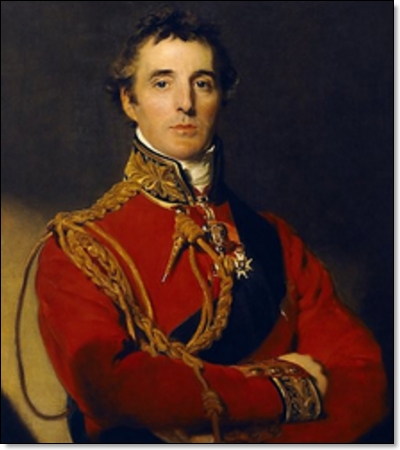Lord Horatio Nelson
The Greatest Admiral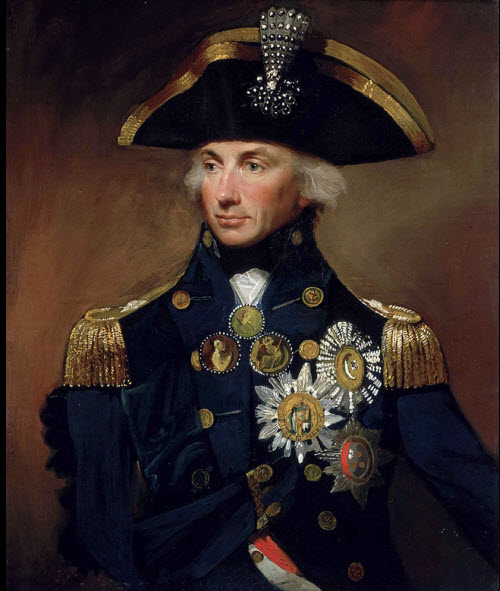
Portrait of Lord Nelson
- Note his missing arm and glass eye.
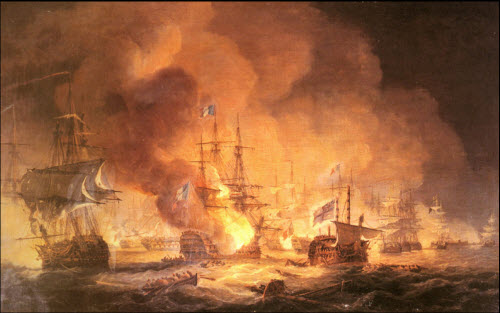
Battle of the Nile

Lady Hamilton - Lord Nelson's Mistress
Horatio Nelson (September 29, 1858 - October 21, 1805) is regarded as the greatest of Britain's admirals. His victory at Trafalgar over the combined Spanish and French fleets is ranks as one of the most important battles in history and made him, posthumously, a national hero.
Nelson was born at at Burnham Thorpe, Norfolk, where his father, Edmund Nelson, was rector. His mother’s maiden name was Suckling, and through her he could claim a collateral kinship with the celebrated Sir Robert Walpole.
As a child he was feeble and sickly; and throughout life his small, frail, and attenuated frame seemed to consort but poorly with the daring and impetuous spirit which “stirred and lifted him to high attempts.” At the age of 12 he entered the royal navy, commencing his career in the Raisonnable, a warship armed with 64 guns, commanded by his uncle, Capt. Suckling. Then, promotion in the first stages of the profession was determined by admiralty interest; and fortunately for him and for England, his uncle, shortly afterward becoming comptroller of the navy, was able to facilitate his rise. His promotion was nearly as rapid as it could be, and before he was quite 21 he had attained the rank of post-captain, which fairly opened the way for him to the higher honors of the service.
Up to this time no opportunity had been afforded him of achieving any marked distinction, but to all who were brought into contact with Nelson he had already proved himself a bold and capable officer. Henceforward, for some years, he was nearly constantly employed in a variety of missions to harrass French and Spanish shipping. As a result, Nelson earned himself a brilliant reputation. However his growing fame was as yet chiefly confined to professional naval circles, no very signal exploit having brought his name prominently before the public.
But with the advent of the war with revolutionary France the time had come when he was to “flame amazement” on the world by a series of noble deeds, in the luster of which all other naval glory looks pale. In his obscurer years, he seems to have been cheered under what pained him as unmerited neglect by that prescience of a grand destiny, which has so often preluded to a career of exceptional splendor. Thus, on one occasion he writes: "They have not done me justice. But never mind. One day I'll have a gazette of my own ” And subsequently the same confidence is expressed with something like the depth of a religious conviction: “ One day or other I will have a long gazette to myself. I feel that such an opportunity will be given me. I cannot, if I am in the field of glory, be kept out of sight; wherever there is anything to be done, there Providence is sure to direct my steps. ”
In 1793 Nelson was appointed to the Agamemnon, a large warship armed with 64 guns. As commander he took a distinguished part, among other services, in the sieges of Bastia and Calvi, in Corsica, losing an eye at the last of these; and in the celebrated action of sir John Jervis off cape St. Vincent with the Spanish fleet, to a maneuver of extreme and masterly daring, executed by Nelson in defiance of orders, that officer was mainly indebted for the splendid success obtained, and the peerage with which it was rewarded.
Though in the interval an expedition which he commanded against Teneriffe had failed disastrously, with loss to himself of his right arm in the assault, it was on all hands admitted that everything was done on the occasion which skill and valor in their highest combination could effect, and Nelson on his return to England in 1797, was received with general acclamation. He was invested with the Order of the Bath, and a pension of £1000 a year was voted to him.
Being next year intrusted with a fleet, he signalized this his first independent command of any magnitude by the stupendous victory of at the Battle of the Nile, memorable in naval annals as the completest annihilation of an enemy on record. See Aboukir. Finding the French fleet—to which his own was considerably inferior in force—skillfully moored so as to defy ordinary attack, he adopted the novel expedient of doubling on the enemy’s ships, and scored a crushing victory over the French fleet, which was almost completely annihilated. Of the French line of battle, only two ships escaped and these were afterward captured.
Nelson was now showered with honors; and in particular the gratitude and enthusiasm of his countrymen were signified by the title bestowed on him of baron Nelson of the Nile, and a grant of £2000 a year for his own life, and the lives of his two immediate successors. For his services immediately subsequent, in effecting the expulsion of the French from Naples, the Neapolitan king rewarded him with the dukedom of Bronte and a domain of £3000 a year.
These last honors, however, were in one sense dearly purchased. The single suspicion of a blot on his public fame is in regard of his relations with the corrupt court of Naples, and of certain questionable acts into which by these he was led. The only flaw in his private character was his affair with lady Hamilton, the wife of the English ambassador, a woman of questionable antecedents, but perilous fascination, with whom he was here thrown in contact. Although Nelson was also married, he carried on his affair with Lady Hamilton to the end of his life and she gave birth to his daughter, Horatia. The affair caused a scandal at the time, but was forgiven due to the public accolades that flowed from his victories.
His next magnificent exploit was the battle of Copenhagen in 1801, in which, after a struggle of terrible severity, he shattered the naval power of Denmark, and along with it the dreaded coalition against England of the three northern kingdoms. Never were the characteristic and heroic qualities of the man more brilliantly displayed than on this most trying occasion. In the moral courage to accept responsibility at all hazards, no man ever surpassed him. In the heat of the battle, his chief, sir Hyde Parker, in deadly anxiety as to the issue of what at a distance seemed to be a hopeless conflict, signaled him to discontinue action. “Damn the signal!” said Nelson, when this was reported to him. “ Keep mine for closer battle flying. That’s the way I answer such signals. Nail mine to the mast.” And with the certainty of professional disgrace and ruin staring him in the face in case of failure, he worked out his grand triumph.
Had Nelson’s services here ceased, his fame would still have been assured as the greatest of England’s naval heroes. But a crowning glory awaited him. In the earlier part of 1805, glowing with fierce ardor and impatience and driven by a desire to make a lasting name for himeself, Nelson had chased half round the world a French fleet of nearly double the force of his own, scared by the very terror of his name; and on the morning of the memorable Oct. 21 of that year, the desire of his eyes was satisfied, when in the bay of Trafalgar he saw before him the combined navies of France and Spain moving to meet him.
The result was an overwhelming victory for the British navy. The naval power of Spain and France was permanently shattered, and England would never be threatened by invasion. Nelson was mortally wounded during the battle and died just as the British victory became certain.
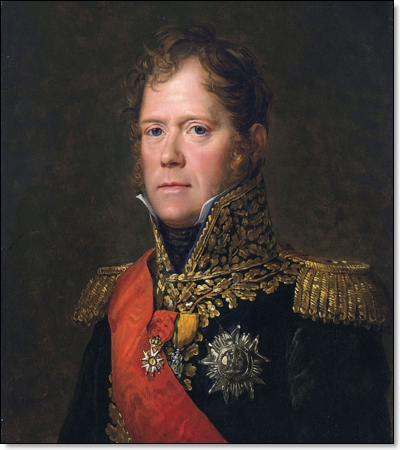
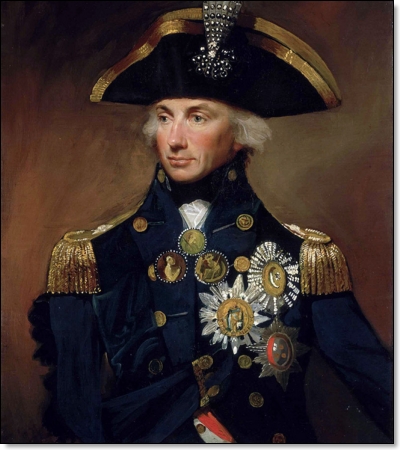
.jpg)
